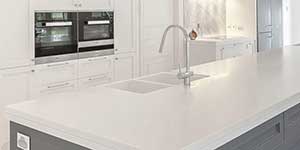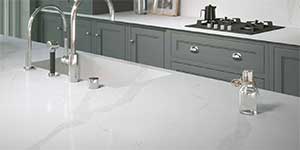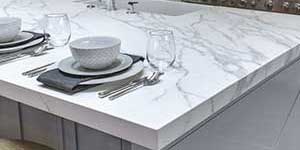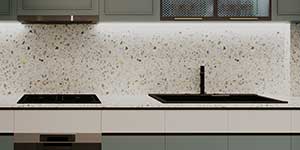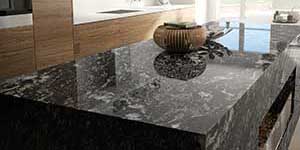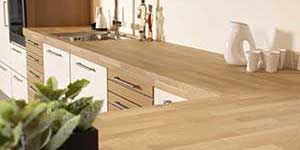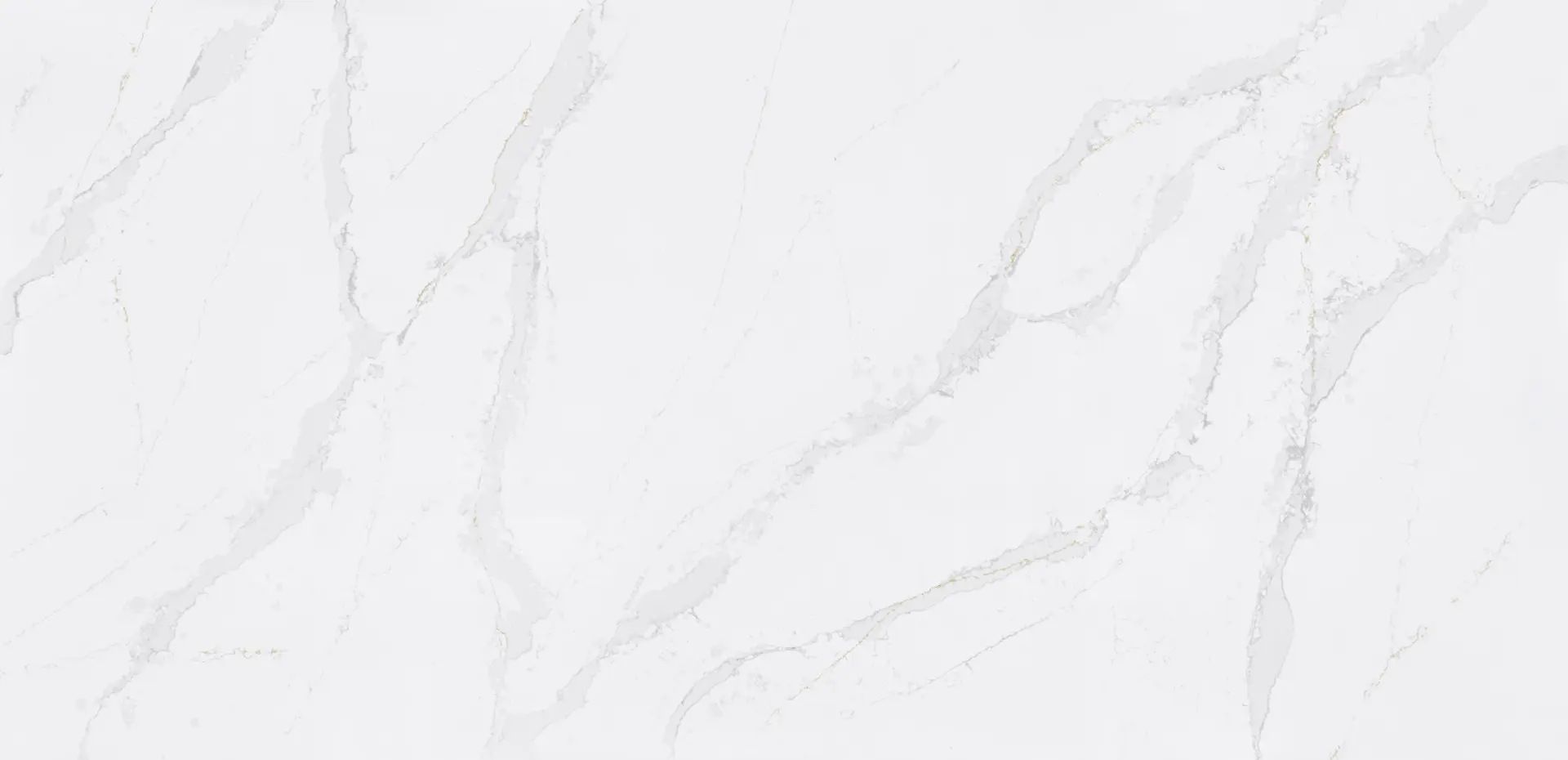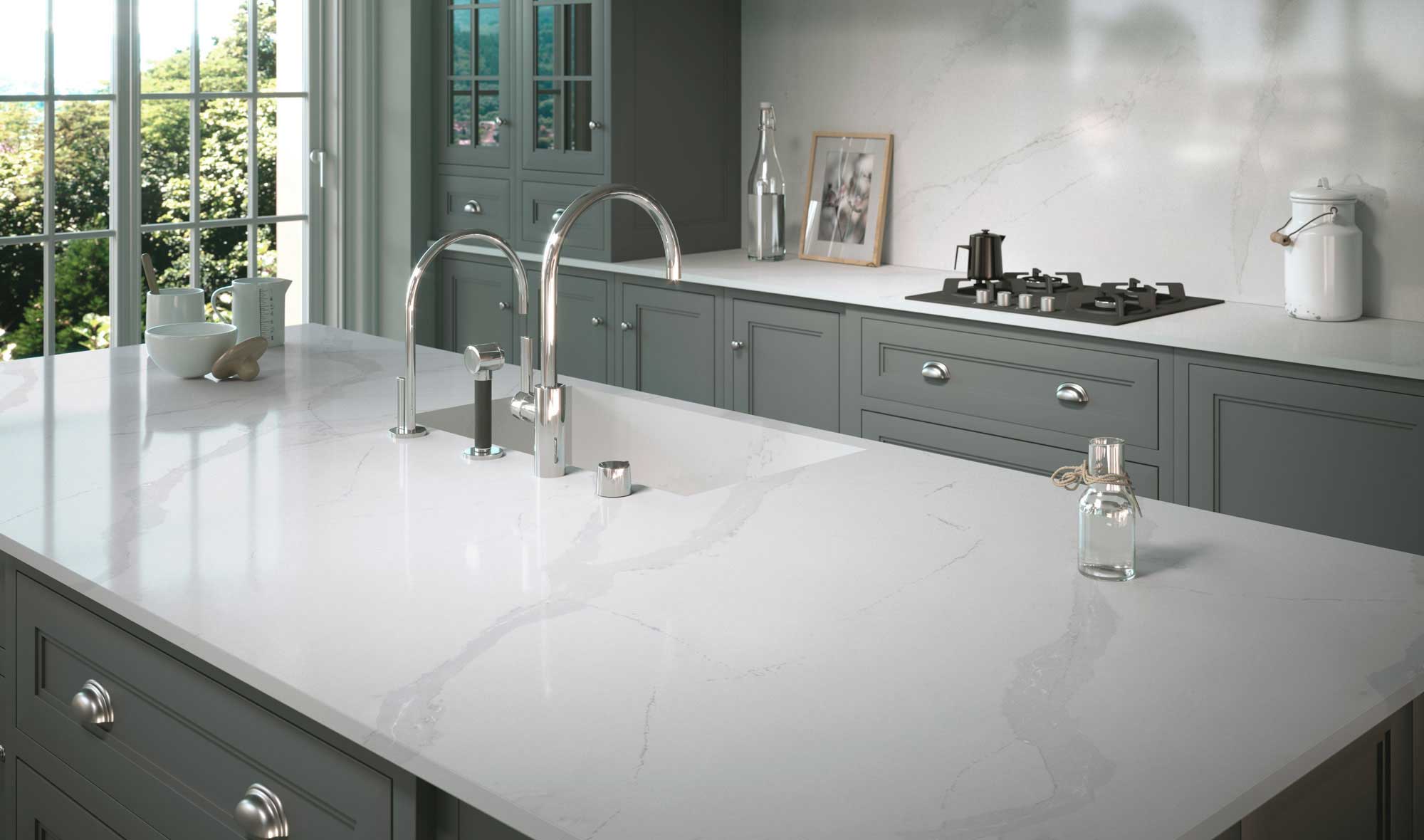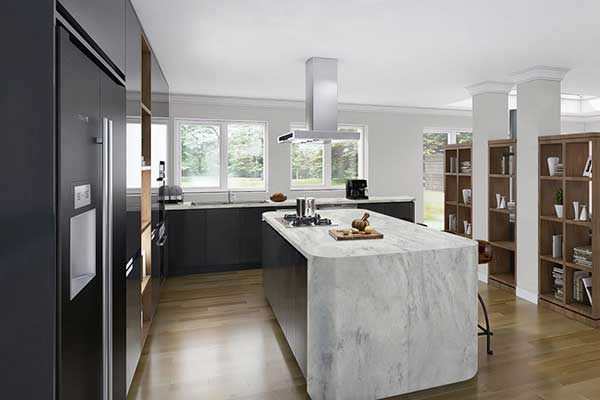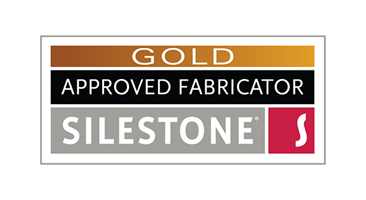To take the strain out of choosing your kitchen worktop, we look at five of the best kitchen worktop materials
Choosing the right kitchen worktop is an exciting part of creating a new kitchen. In addition to some of the older choices of natural and man-made kitchen worktop materials, 21st-century technology has given you a vast choice of new high-tech materials.
Each type of material has its own unique characteristics, and benefits and most of them are available in a vast selection of colours, textures, patterns, and matching accessories. While exciting, that can make it an overwhelming task to select the kitchen worktop best suited to your requirements.
Because you are investing a great deal of money in your new kitchen, you want to do it the right first time and you want to make this an exciting venture, not a confusing one, or one that you will regret but have to live with anyway.
This article aims to help you with this daunting task by highlighting the most important qualities of five of the latest and best kitchen worktop materials. What are they? What are they made of and how are they manufactured? Why would you choose them? What are the disadvantages? What is affordable?
Call us directly on 0330 088 3391 for information on worktop materials or request a quote.
Five of the best countertop materials
- Natural Stone, including granite, Sensa granite, marble, and limestone.
- Quartz worktops are made of composite re-engineered stone, consisting of a minimum of 93% natural quartz crystals.
- Ultra Compact (sintered stone) worktops are made of re-engineered stone, consisting of 96% natural minerals.
- Solid Surface worktops are made of engineered stone, consisting of 93% natural minerals.
- Solid Wood worktops are fabricated from a wide range of the best species of timber, obtained only from sustainable forests.
The two most popular types of Natural Stone kitchen worktops are Granite and Marble
What are Solid Granite Worktops?
Granite is a natural igneous rock, consisting mainly of quartz and feldspar, and it is created through the cooling and solidification of magma or lava.
Granite is quarried in huge blocks from mines all around the world and cut into slabs of different thicknesses, which are then polished and ultimately fabricated into one of the finest kitchen worktops.
What are the different types of granite kitchen countertops?
Black granite countertops have graced many kitchens in the country for centuries, but there are in fact scores of different types, including Black Pearl, Baltic Brown, Tan Brown, Venetian Gold, Kashmir White, Blue, Pink, Red, and even Green Granite.
Sensa granite is created by submitting natural granite to a revolutionary granite sealing treatment called ‘Senguard’ which chemically bonds to the stone, making it non-porous and highly stain resistant.
Are all types of granite equal?
What is sold as “Granite” could actually be thousands of different types of stone, which are not all of equal quality. Be careful when buying a product that is touted as “natural granite” when in fact it is an inferior stone product, often impregnated with chemicals and colour dyes, and reinforced by synthetic mesh to imitate higher quality. Buy only from a reputable supplier who sources granite from dependable quarries.
Should I order granite worktops from a sample?
Each granite slab is unique and can often be very different from the next slab. Colour, vein, and pattern differences are noticeable even within a single slab, which of course is part of the appeal of granite.
It is therefore best though to view granite as a full slab and select slabs that will be compatible with each other.
Why would I choose a granite kitchen worktop?
- Granite worktops are beautiful, luxurious, timeless, and do not go out of fashion.
- They can harmonise with almost any other décor material.
- Granite is strong, resistant to scratches and high temperatures and does not require a lot of maintenance. Sealing them and keeping them clean is usually sufficient to make them last for generations.
What is the downside of granite worktops?
- Granite, like all types of natural stone, is porous. It has tiny fissures, microscopic pores and cracks that, if not properly sealed, can absorb liquids and create places where germs can flourish and the worktop will also eventually stain.
- It requires a fair amount of maintenance. Granite needs to be correctly sealed before the countertops are installed and again at regular intervals.
- Although it is easy to clean, it could be difficult to maintain the gleam and keep them looking clean. Crumbs, food particles, fingerprints, dust, and water streaks show up clearly on the darker colours.
- Granite is vulnerable to sudden changes in temperatures, known as thermal shock, and can crack if a hot pan or pot is put down on a cold granite worktop.
- Because colours, veins, and patterns are unique to each slab, granite does not have as wide a colour selection as engineered stone.
Are granite worktops expensive?
Granite falls into the mid-range pricing bracket. Because they will last for a very long time, and because they add value to the resale value of your house, good quality granite worktops are considered a good investment.
What are Marble Kitchen Worktops?
Marble belongs to another one of the three main rock groups, namely metamorphic rock, which is formed when calcite or limestone is placed under immense pressure and temperatures.
Marble is quarried in large blocks from mines around the world, cut into slabs of various thicknesses, polished and fabricated into kitchen worktops by professional worktop fabricators.
What are the different types and colours of marble?
Marble countertops are usually installed as a light-coloured stone with shades of grey, brown, pink, or black, but did you know it even comes in shades of gold, yellow, red and blue?
The colour of marble depends on the impurities such as iron oxides, bitumen, clay, sand, and a variety of minerals present during the metamorphosis.
The unique marble patterns are formed by deposits of minerals swirling in highlight shades inside the limestone before it solidifies. White marble is the purest form of limestone, with few or no impurities to create shades of colour.
Can I choose my marble kitchen worktops from a sample?
Each marble slab is completely different and colours and veins may differ greatly from the next slab. You will find unique colour and pattern differences even within the slab.
It is best to view marble as a full slab and also to select slabs that will be compatible with each other.
Are all Marble Worktops of equal quality?
Virtually every store that sells countertops will offer the choice of marble, but it is important to note that the quality can vary greatly.
Although marble, like all types of natural stone, has fissures and microscopic pores, poor-quality marble is the most porous and brittle.
The best quality marble is noted for its purity, durability, minimal porosity, and colour. A simple test for high porosity is to drop 3-4 droplets of lemon juice on the surface of the unsealed marble. With poor-quality marble, the droplets will be absorbed immediately.
It is best to buy your marble kitchen worktops from a reputable supplier that guarantees the quality of their marble worktops.
Why would I choose Marble worktops?
There is hardly a person who does not admire the beauty and luxury of marble worktops. Its natural luminosity, brightness and smoothness when polished, sets it apart from other natural stone worktops.
What is the downside of marble worktops?
It is fair to ask that if marble is so special, why should I even consider something else?
The answer lies in the amount of work involved in keeping marble kitchen worktops in pristine condition. Engineered stone, such as quartz, ultra-compact, and solid surface eliminate these shortcomings.
- Marble is a soft stone that is susceptible to stains, scratches, and wear & tear.
- It is porous, with a large number of microscopic fissures and crevices where bacteria can flourish and liquids can penetrate the surface and stain the marble.
- It is easy to maintain and clean, but more difficult to keep it looking clean. Scratches and stains can make the marble look old and tired if it is not properly sealed, maintained and cleaned.
- Like other types of natural stone, marble is vulnerable to thermal shocks and if hot pots or pans are suddenly placed on the marble, it may crack.
Are marble worktops expensive?
The price of marble varies greatly, but generally, it is more expensive than granite or other natural stone worktops.
The fact that they add considerable value to the resale price of your house, and last longer if they are properly cared for, makes marble kitchen worktops a good investment. The better the quality, the better the investment.
What are Quartz Worktops?
Quartz kitchen worktops are ultra-luxurious worktops, man-made from composite engineered stone. Through a special heat and vibro-compaction process, 90-94% natural quartz crystals are blended with resins, polymers, and colour pigments, into one of the hardest worktop surfaces known, with a rating of 7 on the Mohs scale (marble = 3 and diamonds = 10)
Can I order a quartz kitchen worktop from a sample?
Quartz kitchen worktops are manufactured with consistent colouring, patterns, and textures, and there will be no nasty surprises. Colours and patterns will match across different slabs with much greater certainty because slabs are individually identified for colour matching.
Why would I choose a Quartz kitchen worktop?
The premier brands of quartz worktops take beauty and durability to new levels.
- They are available in a wide range of patterns and crystal-like colours. Re-engineered quartz worktops have a 3-dimensional appearance and lustre unlike any other.
- Quartz worktops are completely nonporous, and they are ultra-hygienic, easy to clean and actively resist heat, water, bacteria, and stains. They do not require any form of sealing and very little maintenance.
- They also contain silver ions as an active ingredient that fights bacteria.
- They are extremely durable and will last for generations. They are highly resistant to chips, cracks, and heat.
- The resin content makes them much stronger and more resilient than granite or marble and they are less likely to break.
- There is an extensive range of matching accessories, integrated sinks and basins, and much more. Harmonising quartz flooring and wall cladding can complete this picture.
- Because of colour, vein, and pattern consistency, slabs match up much better, without sacrificing the natural beauty of granite or marble.
- Joints are almost imperceptible, creating a uniform appearance.
What is the downside of Quartz kitchen worktops?
- They are more expensive than granite or marble kitchen worktops because they are of superior quality.
- They are only available from approved dealers and can only be installed and repaired by professionals.
- Although they are much more resistant to thermal shock than granite or marble, the surface can be scorched or dulled by extreme heat.
- Prolonged exposure to the sun can fade the colours, making them unsuitable for outdoor use.
- They are not suitable for areas where they are exposed to extreme conditions, or where they are constantly exposed to direct sunlight.
Are Quartz worktops expensive?
Because quartz worktops are made of re-engineered natural stone and minerals, they are of superior quality and therefore more expensive than granite and marble. However, they increase the value of your home and because they provide a lifetime of value, they are considered a good investment.
What are Ultra-Compact Kitchen Worktops?
Ultra-Compact kitchen worktops are made from a revolutionary new material that is almost indestructible, called sintered stone. They are of exceptional density, strength, and hardness.
Using new a completely new process, known as Sintered Particle Technology, granite, quartz, silica, glass, ceramics, and natural oxides are blended and then compacted under pressure of up to 400 bars at a temperature of 1200 °C to fuse them without melting them, creating an incredibly strong and compact kitchen worktop that is completely non-porous.
Why would I want to own ultra-compact kitchen worktops?
- Ultra-compact kitchen worktops are in a class of their own and are super luxurious
- They replicate all the appealing aesthetic qualities of marble and granite worktops, even improving on their beauty, with exceptional structural strength, flexibility, hardness, and density.
- Sintered stone is completely UV-stable and chemical resistant, which means it is completely colour-fast and the colours do not fade over time. This makes ultra-compact worktops highly suitable for kitchen worktops, breakfast bars, and outdoor applications.
- They are almost indestructible, with exceptional heat resistance, durability, and strength.
- They will not be damaged by chemicals or water and do not require sealing.
- They are available in a wide range of patterns, textures, colours, veins, and finishes.
- The wide array of colours and veins are embedded throughout the material for the ultimate luxurious appearance, colour stability and colour matching across slabs and eliminates the need for edging.
- Because of their immense strength and hardness, Ultra-Compact worktops can be manufactured in larger sheets than other worktops, making them incredibly versatile, with greater design options, and could also save on weight and cost.
- You have the choice of a colour-coordinated integrated sink and accessories.
What is the downside of Ultra Compact Kitchen Worktops?
- They are more expensive than marble or granite worktops.
- Because of its exceptional hardness, the ultra-compact worktop can chip, but it can easily be repaired, using the repair it provided. A chopping board is recommended when cutting food.
- They are only available at approved dealers and can only be installed by professional installers.
What are Solid Surface Kitchen Worktops?
Solid surface kitchen worktops are a magnificent improvement on natural beauty and luxury, eliminating all the imperfections, fissures and cracks.
They are manufactured from a unique composite of about 66% pulverised natural minerals and 33% pure acrylic, polyester, or polymer resins, and colour pigments. The materials are blended and compressed into slabs under high temperatures.
Why would I want Solid Surface kitchen worktops?
- A premier-quality Solid Surface kitchen worktop is extremely luxurious and will last for generations.
- They emulate the natural beauty of granite and marble and will always remain in fashion in any kitchen design.
- The stone-hard kitchen worktop can be shaped, moulded, sanded, engraved, and fabricated to meet any design requirements.
- It is completely non-porous, easy to clean and maintain and is highly resistant to stains.
- They are heat resistant and will not be damaged by placing hot pans straight onto the surface, but it is still recommended that a trivet is used.
- They are available in a very wide array of colours, textures and patterns to emulate the qualities and appearance of natural marble, granite, sandstone, slate or other natural stone.
- Integrated moulded sinks and bowls with drainer grooves, upstands and downturns, and accessories are fabricated in the same colour and – because joints are almost invisible – the completed kitchen or bathroom has a truly uniform appearance, almost as if everything has been cut from a solid block of marble or granite.
- They are easy to maintain and repair. Scratches can be sanded out and more serious damage can easily be repaired by professionals.
What is the downside of Solid Surface kitchen worktops?
- They are more expensive than marble worktops or granite countertops.
- The worktop surface is vulnerable to scratches, although it can be repaired easily with a repair kit.
- The surface can be damaged by certain chemicals.
Are solid surface kitchen worktops expensive?
Top-quality solid surface worktops are more expensive than natural granite or marble, but they are much stronger and more versatile, without any of the flaws found in solid stone.
The top brands will last a lifetime and will add considerable value to the resale price of your home.
Which types of timber are most suitable for solid wood Worktops?
Oak, maple, beech, cherry, elm, iroko, and walnut have been used as kitchen worktops for centuries. They are all strong and hard-wearing and their appearance improves with time as they develop a unique patina.
If properly sealed and sterilised at regular intervals, water does not penetrate the surface and if properly done, the almost seamless joints do not leave crevices for germs to accumulate. Wood has natural antimicrobial properties that actively kill germs.
Why would I choose wood worktops?
- They have a unique beauty and if properly cared for will last for many years.
- Each type of wood has its own colour, grains and patterns, and no two pieces of wood from the same tree are alike.
- Wood has a timeless style and will always remain in fashion. It lends itself to a variety of kitchen designs, from traditional to modern and contemporary.
- Wooden worktops are highly durable. They can withstand heavy knocks and will last for generations.
What is the downside of wood worktops?
- Some wood species are expensive and generally, wooden kitchen worktops are more expensive than glass, stainless steel and laminate worktops
- Can be water damaged and absorb stains, if not sealed properly and regularly.
- Prone to scratch marks and can be scorched by hot pans and pots (although these can be easily repaired.)
For more detail on each of the top-quality materials call 0330 088 3391
Other inspiring articles
Why Silestone Eternal Calacatta Gold is one of the UK’s best selling worktop colours
In the world of interior design, the kitchen is more than just a functional space; it's the heart of the home, a place where style meets practicality. One of the standout stars in kitchen [...]
A Solid Choice: Why Solid Surface Worktops are a Top Pick for your Kitchen
Solid surface worktops, such as Corian, Hanex, and Hi-macs, have been steadily gaining popularity in the world of kitchen design and renovation. While there's a plethora of worktop materials to choose from, solid surface [...]
Choosing the Perfect Kitchen Worktop
A comprehensive guide to Quartz, Solid Surface, Ultra Compact, Granite, and Wood When it comes to designing your dream kitchen, one of the most crucial decisions you'll make is selecting the perfect [...]
How to restore Corian countertops
Corian countertops are a popular choice for many homeowners due to their durability and low maintenance requirements. But if yours has become stained or damaged, you’ll need to know how to restore [...]

